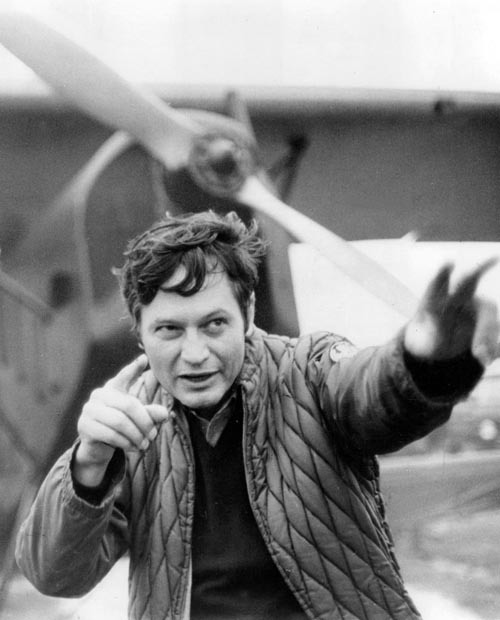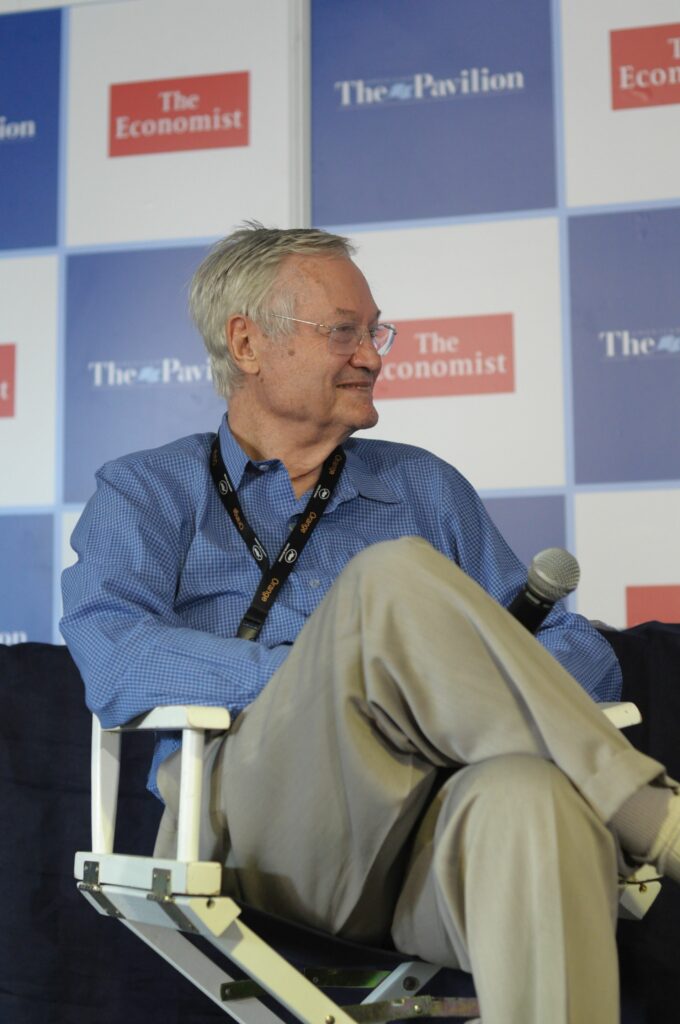The independent film world has lost one of its all-time icons: Producer, director, distributor, and mentor, ROGER CORMAN. With over 400 produced films to his name (including 60 as director), Roger Corman was a low-budget filmmaking godfather, legend, kingmaker, and any other profound moniker you can give a person.
An Ambitious Beginning
Born in Detroit in 1926, Corman moved to Los Angeles with his family as a teenager. After serving in the U.S. Navy during WWII, Corman received an engineering degree from Stanford (where he also wrote film reviews for the school newspaper). He then returned to LA to try his hand at a film career in the 20th Century Fox mailroom. Working his way up in Hollywood but feeling stifled by the studio development system, Corman decided to strike out independently. He left Fox to produce his first film — 1954’s Monster From the Ocean Floor — with money raised from friends, family, and his own savings.
That debut film, shot for $12,000 over six days, ended up grossing $850,000 and launched a trend of cheap but profitable “B-movies” — often featuring some combination of scares, sex, or rock & roll — that would define Corman’s career. Cost-cutting and efficiency were key to Corman’s success – he directed a staggering nine feature films in 1957 alone and made The Little Shop of Horrors in just two days using the leftover sets from A Bucket of Blood.
Other memorable Corman features include eight Edgar Allen Poe adaptations with actor Vincent Price (including House of Usher, The Pit and the Pendulum, and The Raven) as well as hit indies Attack of the Crab Monsters, The Wild Angels, The Trip, Boxcar Bertha, Death Race 2000, Piranha, Rock ‘n’ Roll High School, and The Slumber Party Massacre. Not all of his films were written off as B-movie schlock, however: 1962’s The Intruder screened at the prestigious Venice International Film Festival, and 1977’s I Never Promised You a Rose Garden received an Oscar nomination for its screenplay.
Even in his seventh decade of producing, Corman was churning out films and achieving new career landmarks. In 2013, Virtually Heroes became the first Corman production to premiere at the Sundance Film Festival. But a lengthy career and the sheer number of inexpensive movies he cranked out are just the most obvious elements of Roger Corman’s filmmaking legacy.
An Eye for Talent
In addition to his vast output of films, Roger Corman also became a mentor to countless up-and-coming filmmakers and actors, many of whom went on to huge careers. Francis Ford Coppola once worked as his assistant before becoming one of the most celebrated directors of the New Hollywood era. When actors Ron Howard and Carl Franklin wanted to shift to directing, Roger Corman gave them both their first jobs behind the camera. And before her career as the producer of mega franchises like The Terminator and The Walking Dead, Gale Anne Hurd worked as Corman’s assistant before he encouraged her to aim higher. As Hurd recalled, “[Roger] is the only person I’ve known in the industry who wanted his protégés to succeed, and perhaps have even more impressive credentials than his own.”
Other filmmakers who got their start working on Corman productions: Peter Bogdanovich, James Cameron, John Carpenter, Joe Dante, Jonathan Demme, Curtis Hanson, Monte Hellman, Frank Marshall, John Sayles, Martin Scorsese, Penelope Spheeris, and Robert Towne. Some of Corman’s apprentices even cast him as an actor in their later films; he pops up in Coppola’s The Godfather Part II, Demme’s The Silence of the Lambs, and Howard’s Apollo 13, to name a few.
Roger Corman also had a hand in launching some movie stars. Mel Gibson, Melissa Leo, Jack Nicholson, Bill Paxton, Dennis Quaid, and Talia Shire all made their film debuts in Corman productions; and actors including Sandra Bullock, David Carradine, Robert De Niro, Pam Grier, Barbara Hershey, Diane Ladd, and Sylvester Stallone all landed early lead roles in Corman films. As Carradine once noted, “It’s almost as though you can’t have a career in this business without having passed through Roger’s hands for at least a moment.”

A Sense for Business
In 1959, Corman founded his first distribution company, The Filmgroup, to self-release his movies. The company was acquired by American International Pictures in 1963, and Roger took those early lessons in distribution when he launched the much more prolific New World Pictures in 1970. In addition to producing and releasing Corman’s own movies, New World also imported international films for American distribution. Thanks to him, U.S. audiences were able to see arthouse titles from Ingmar Bergman, David Cronenberg, Federico Fellini, Werner Herzog, Akira Kurosawa, and François Truffaut for the first time, influencing a generation of filmmakers and cinephiles alike. Within 10 years, Corman’s company had released three Academy Award winners for Best Foreign Language Film – Amarcord, Dersu Uzala, and The Tin Drum.
While Roger Corman was most famous for slashing budgets, he was business-savvy far beyond production costs. His ability to make films quickly meant building up a large library of titles, which he was then able to monetize well after their initial releases. His ear for catchy titles led him to license The Fast and the Furious to Universal’s behemoth franchise, and he ended up with a financial cut from Rockstar Games for the use of his title Grand Theft Auto. Corman even got into the Marvel Cinematic Universe game early, producing a low-budget (notoriously unreleased) Fantastic Four adaptation in 1994. In 2018, he sold 270 of his titles to the Chinese film market to remake. Corman once told The Hollywood Reporter, “If you’re just a straight businessman, your pictures will not be good. And if you’re just a straight artist, you’ll lose money. You have to be a businessman to understand art, and an artist to understand business.”
A Legacy Money Can’t Buy
Being synonymous with DIY filmmaking, it took America’s mainstream film critics a while to catch up to Corman’s importance. Film historian David Kalak wrote, “Corman, you see, was a serious artist. Sure, he worked in the indie world’s backwater of quickie exploitation pictures, but that never stopped him taking his work – or himself – seriously.” Perhaps simply because he didn’t go away, Roger Corman eventually earned the respect of the Hollywood establishment. He received Lifetime Achievement Awards from the Casting Society of America; the Academy of Science Fiction, Fantasy & Horror Films; the Los Angeles Film Critics Association; the Visual Effects Society; the Telluride Film Festival; and the Producers Guild of America. In 2009, he was awarded an Honorary Oscar by the Academy of Motion Pictures Arts & Sciences for his “unparalleled ability to nurture aspiring filmmakers by providing an environment that no film school could match.”
Corman chronicled his career exploits in a perfectly titled 1990 memoir, How I Made a Hundred Movies in Hollywood and Never Lost a Dime (which, after reading it, inspired The Wachowskis to write their first screenplay). Other filmmakers were inspired enough by Corman’s life to pursue him as the subject of documentaries, including 1978’s Roger Corman: Hollywood’s Wild Angel, 2011’s Corman’s World: Exploits of a Hollywood Rebel, and 2015’s Doomed: The Untold Story of Roger Corman’s The Fantastic Four.

Roger Corman continued being a mentor to aspiring filmmakers throughout the entirety of his career. At the 2011 Cannes Film Festival, he spoke with film students for a SAGindie-sponsored talk at the American Pavilion. He even launched a virtual Quarantine Film Festival in 2020, challenging filmmakers to use the limitations of COVID-19 stay-at-home orders to get creative with a micro-budget film. To this day, the “Godfather of Independent Film”/“King of the B Movies”/“Pope of Pop Cinema” continues to be an inspiration for countless directors and producers. Those who want to learn more about his style and influence should read his 10 lessons on filmmaking for Filmmaker Magazine to follow in those prolific and inventive (yet budget-conscious) footsteps.
With his passing, it seems appropriate to end with a quote from the late, great Jonathan Demme, who said of his mentor, “Roger is arguably the greatest independent filmmaker the American film industry has ever seen and will probably ever see.”
Roger Corman died on May 9, at the age of 98.
——
If you’re an independent filmmaker or know of an independent film-related topic we should write about, email blogadmin@sagindie.org for consideration.

